-
 Bitcoin
Bitcoin $85,555.6327
-2.30% -
 Ethereum
Ethereum $2,324.0079
-4.29% -
 Tether USDt
Tether USDt $0.9992
0.03% -
 XRP
XRP $2.2021
-3.30% -
 BNB
BNB $606.2789
-2.71% -
 Solana
Solana $139.8045
0.42% -
 USDC
USDC $1.0001
0.01% -
 Dogecoin
Dogecoin $0.2092
-0.55% -
 Cardano
Cardano $0.6669
-1.87% -
 TRON
TRON $0.2280
-0.61% -
 Chainlink
Chainlink $15.4229
-1.05% -
 Litecoin
Litecoin $129.3021
2.54% -
 Avalanche
Avalanche $22.8937
2.85% -
 Sui
Sui $2.8621
-4.99% -
 Stellar
Stellar $0.2873
-3.01% -
 Shiba Inu
Shiba Inu $0.0...01457
1.80% -
 Toncoin
Toncoin $3.4357
-3.70% -
 Hedera
Hedera $0.2022
2.16% -
 UNUS SED LEO
UNUS SED LEO $9.1468
1.71% -
 Polkadot
Polkadot $5.0963
5.03% -
 MANTRA
MANTRA $7.3311
-3.40% -
 Hyperliquid
Hyperliquid $20.4125
0.11% -
 Bitcoin Cash
Bitcoin Cash $299.4335
1.13% -
 Ethena USDe
Ethena USDe $0.9994
0.00% -
 Dai
Dai $0.9999
0.02% -
 Bitget Token
Bitget Token $4.1399
3.02% -
 Uniswap
Uniswap $8.0898
-0.64% -
 Monero
Monero $214.4641
-1.50% -
 Aptos
Aptos $6.2698
8.76% -
 NEAR Protocol
NEAR Protocol $3.0938
0.79%
How transparent is a Bitcoin ETF?
Transparency is paramount for Bitcoin ETFs, ensuring that investors can trust the fund's operations and the security of their investments.
Feb 16, 2025 at 08:01 pm
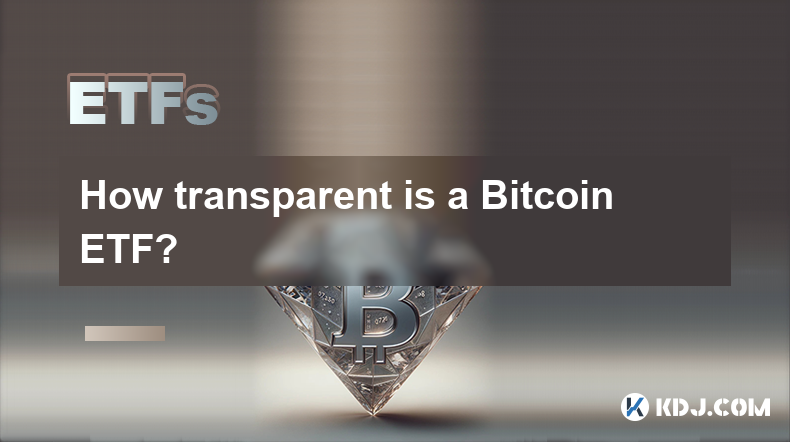
How Transparent is a Bitcoin ETF?
Key Points:
- Definition of Bitcoin ETF
- Benefits of Bitcoin ETFs
- Transparency of Bitcoin ETFs
- Scrutinizing Bitcoin ETF Structure
- Examining Bitcoin ETF Holdings
Definition of Bitcoin ETF
A Bitcoin exchange-traded fund (ETF) is a type of investment fund that tracks the price of Bitcoin. It provides investors exposure to the cryptocurrency without the need to buy and hold the underlying asset directly. Bitcoin ETFs are traded on traditional exchanges like stocks, making them accessible to a wider range of investors.
Benefits of Bitcoin ETFs
- Diversification: Bitcoin ETFs offer diversification to portfolios by adding exposure to a new asset class.
- Accessibility: ETFs provide an easy and convenient way to invest in Bitcoin for those unfamiliar with crypto exchanges or digital wallets.
- Reduced Volatility: ETFs typically experience lower volatility than directly holding Bitcoin, due to diversification and professional management.
- Regulatory Oversight: Bitcoin ETFs are regulated by financial authorities, providing investors with an additional layer of protection.
Transparency of Bitcoin ETFs
The transparency of a Bitcoin ETF refers to the level of disclosure and accountability provided by the fund to its investors. Transparency is crucial for building investor trust and ensuring that the fund is operating in a fair and equitable manner.
Scrutinizing Bitcoin ETF Structure
Understanding the structure of a Bitcoin ETF is essential for assessing its transparency. Key aspects to consider include:
- Custody: Where are the Bitcoin holdings of the ETF stored and how are they secured?
- Pricing: How is the ETF's price determined and how frequently is it updated?
- Expenses: What fees, expenses, and other costs are associated with investing in the ETF?
- Auditing: Who audits the ETF and what level of oversight do they provide?
Examining Bitcoin ETF Holdings
The composition of a Bitcoin ETF's holdings is a fundamental indicator of its transparency. Investors should scrutinize the following:
- Diversification: Does the ETF hold a variety of Bitcoin-related assets, such as spot Bitcoin, derivatives, or mining companies?
- Custody Risk: Are the ETF's Bitcoin holdings subject to any third-party custody arrangements, and if so, what are the safeguards in place?
- Redemption Mechanics: How can investors redeem their ETF shares for Bitcoin or cash?
- Tracking Performance: How closely does the ETF's performance track the underlying spot Bitcoin price?
FAQs:
What is the underlying asset of a Bitcoin ETF?
Bitcoin ETFs typically track the price of the underlying Bitcoin cryptocurrency.
How does a Bitcoin ETF differ from a mutual fund?
Bitcoin ETFs are traded on exchanges like stocks, while mutual funds are typically bought and sold through brokers or directly with the fund company.
Can I invest in a Bitcoin ETF with a regular brokerage account?
Yes, many traditional brokerage accounts now allow you to invest in Bitcoin ETFs.
How secure are Bitcoin ETFs?
The security and transparency of a Bitcoin ETF depend on factors such as the custody arrangements, auditing practices, and anti-fraud measures in place.
What are the potential risks of investing in a Bitcoin ETF?
Investing in a Bitcoin ETF carries the same risks as investing in Bitcoin itself, such as price volatility, regulatory changes, and the possibility of fraud or hacking.
Disclaimer:info@kdj.com
The information provided is not trading advice. kdj.com does not assume any responsibility for any investments made based on the information provided in this article. Cryptocurrencies are highly volatile and it is highly recommended that you invest with caution after thorough research!
If you believe that the content used on this website infringes your copyright, please contact us immediately (info@kdj.com) and we will delete it promptly.
- Shiba Inu (SHIB) Ecosystem Burns Nearly 31 Million Tokens in a Stunning Surge
- 2025-02-27 23:15:32
- Doge Uprising (DUP) Leads the Meme Coin Market Cap Race as Investors Search for the Next 100x Gem
- 2025-02-27 23:15:32
- Native arranges $25M hack-proof cover for Team Rizzo, Bittensor staking validator
- 2025-02-27 23:15:32
- Nexo Partners with Cross-Border Payment Provider Sphere to Expand Financial Access Through Stablecoin-Powered Transactions
- 2025-02-27 23:15:32
- Hamster Kombat has just unveiled its season 2 with the promise of being “more than just a game”
- 2025-02-27 23:05:31
- Initia: The Future of Application Chains
- 2025-02-27 23:05:31
Related knowledge
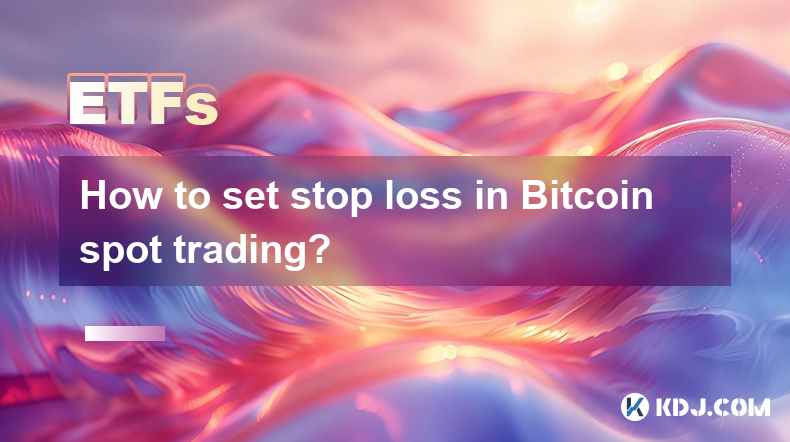
How to set stop loss in Bitcoin spot trading?
Feb 27,2025 at 10:36pm
How to Set Stop Loss in Bitcoin Spot Trading?Key Points:Understanding Stop-Loss Orders: A comprehensive explanation of what stop-loss orders are, how they function within the context of Bitcoin spot trading, and their crucial role in risk management. We'll differentiate between market and limit stop orders and their respective implications.Determining Y...
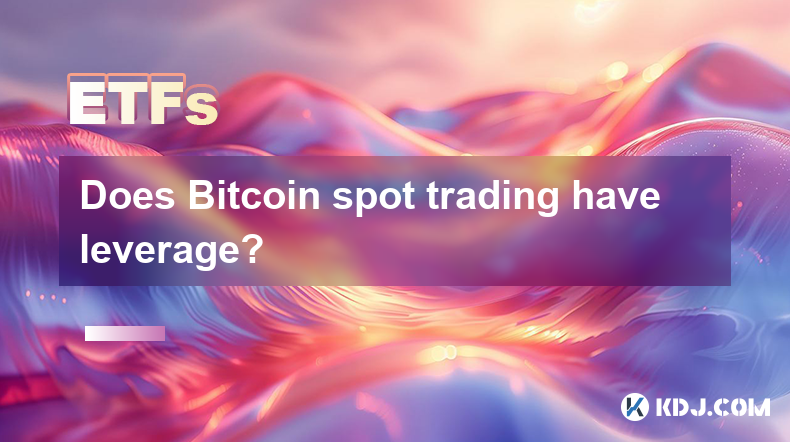
Does Bitcoin spot trading have leverage?
Feb 27,2025 at 07:25pm
Does Bitcoin Spot Trading Have Leverage? Unpacking the Nuances of Leveraged and Unleveraged Bitcoin TradingKey Points:Spot trading: This involves the immediate exchange of Bitcoin for fiat currency or another cryptocurrency at the current market price. It inherently does not offer leverage.Leveraged trading: This utilizes borrowed funds to amplify poten...
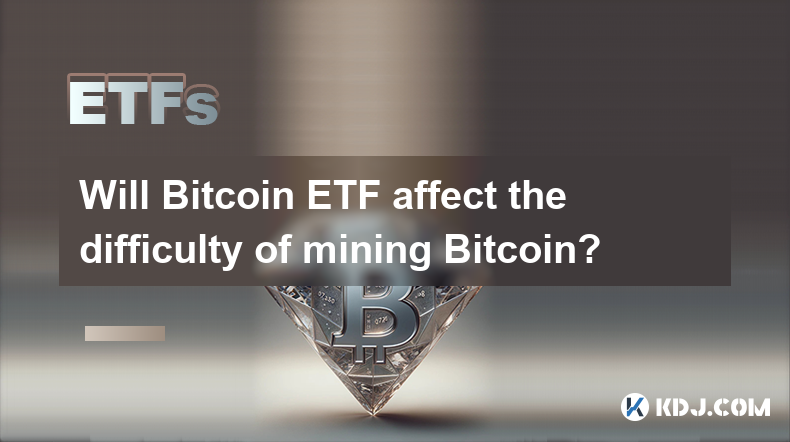
Will Bitcoin ETF affect the difficulty of mining Bitcoin?
Feb 27,2025 at 11:24am
Will Bitcoin ETF Affect the Difficulty of Mining Bitcoin?Key Points:An approved Bitcoin ETF (Exchange-Traded Fund) is likely to increase the demand for Bitcoin, potentially driving up its price.Increased Bitcoin price doesn't directly affect the Bitcoin mining difficulty algorithm.However, a higher price can indirectly influence mining difficulty throug...
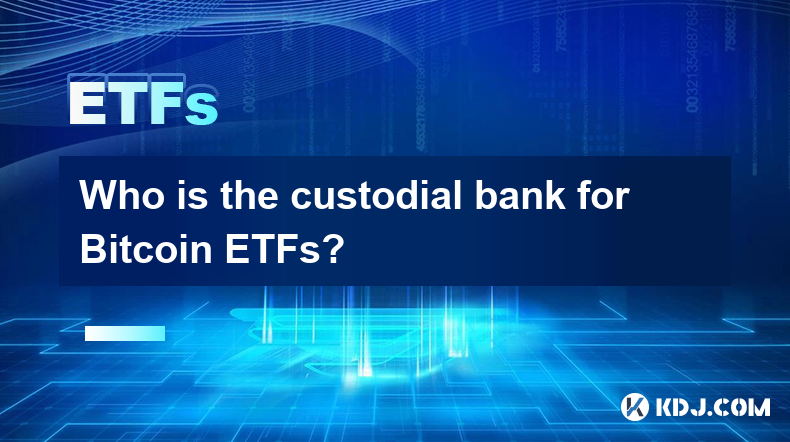
Who is the custodial bank for Bitcoin ETFs?
Feb 27,2025 at 05:12am
Who is the Custodial Bank for Bitcoin ETFs? A Deep Dive into Custody Solutions for Crypto Exchange-Traded FundsKey Points:The role of a custodial bank in a Bitcoin ETF is crucial for ensuring the security and integrity of the underlying Bitcoin assets. They act as a trusted intermediary, safeguarding the Bitcoin held on behalf of ETF investors.Several f...
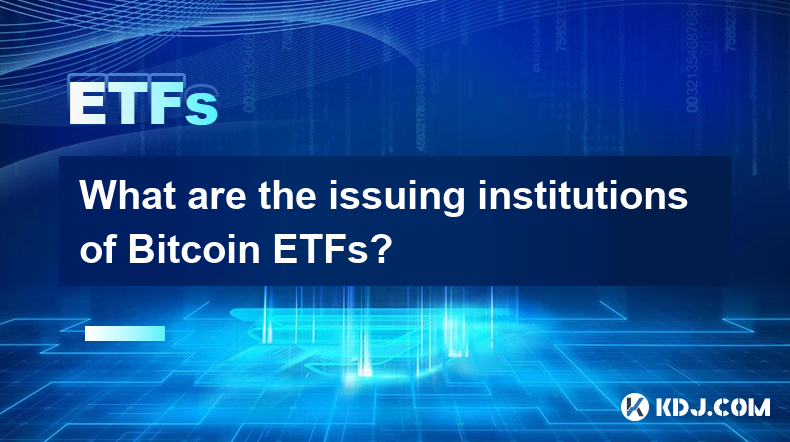
What are the issuing institutions of Bitcoin ETFs?
Feb 27,2025 at 04:44pm
What are the Issuing Institutions of Bitcoin ETFs?Key Points:Currently, no Bitcoin ETFs are approved for trading on major US exchanges. However, several applications are pending approval with the SEC, and various firms are vying to be the first to launch a successful product.The landscape of potential Bitcoin ETF issuers is diverse, encompassing e...
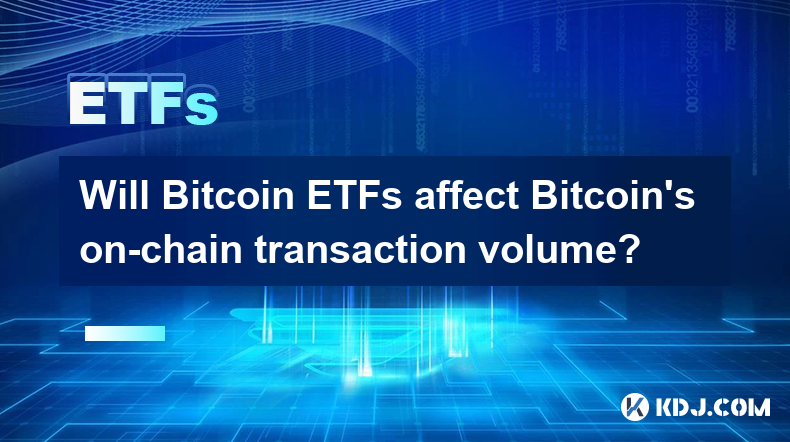
Will Bitcoin ETFs affect Bitcoin’s on-chain transaction volume?
Feb 27,2025 at 02:24am
Will Bitcoin ETFs Affect Bitcoin’s On-Chain Transaction Volume?Key Points:The approval of Bitcoin ETFs could significantly increase institutional investment in Bitcoin, potentially leading to higher on-chain transaction volume. This is because institutional investors often utilize on-chain transactions for various purposes, unlike retail investors who m...

How to set stop loss in Bitcoin spot trading?
Feb 27,2025 at 10:36pm
How to Set Stop Loss in Bitcoin Spot Trading?Key Points:Understanding Stop-Loss Orders: A comprehensive explanation of what stop-loss orders are, how they function within the context of Bitcoin spot trading, and their crucial role in risk management. We'll differentiate between market and limit stop orders and their respective implications.Determining Y...

Does Bitcoin spot trading have leverage?
Feb 27,2025 at 07:25pm
Does Bitcoin Spot Trading Have Leverage? Unpacking the Nuances of Leveraged and Unleveraged Bitcoin TradingKey Points:Spot trading: This involves the immediate exchange of Bitcoin for fiat currency or another cryptocurrency at the current market price. It inherently does not offer leverage.Leveraged trading: This utilizes borrowed funds to amplify poten...

Will Bitcoin ETF affect the difficulty of mining Bitcoin?
Feb 27,2025 at 11:24am
Will Bitcoin ETF Affect the Difficulty of Mining Bitcoin?Key Points:An approved Bitcoin ETF (Exchange-Traded Fund) is likely to increase the demand for Bitcoin, potentially driving up its price.Increased Bitcoin price doesn't directly affect the Bitcoin mining difficulty algorithm.However, a higher price can indirectly influence mining difficulty throug...

Who is the custodial bank for Bitcoin ETFs?
Feb 27,2025 at 05:12am
Who is the Custodial Bank for Bitcoin ETFs? A Deep Dive into Custody Solutions for Crypto Exchange-Traded FundsKey Points:The role of a custodial bank in a Bitcoin ETF is crucial for ensuring the security and integrity of the underlying Bitcoin assets. They act as a trusted intermediary, safeguarding the Bitcoin held on behalf of ETF investors.Several f...

What are the issuing institutions of Bitcoin ETFs?
Feb 27,2025 at 04:44pm
What are the Issuing Institutions of Bitcoin ETFs?Key Points:Currently, no Bitcoin ETFs are approved for trading on major US exchanges. However, several applications are pending approval with the SEC, and various firms are vying to be the first to launch a successful product.The landscape of potential Bitcoin ETF issuers is diverse, encompassing e...

Will Bitcoin ETFs affect Bitcoin’s on-chain transaction volume?
Feb 27,2025 at 02:24am
Will Bitcoin ETFs Affect Bitcoin’s On-Chain Transaction Volume?Key Points:The approval of Bitcoin ETFs could significantly increase institutional investment in Bitcoin, potentially leading to higher on-chain transaction volume. This is because institutional investors often utilize on-chain transactions for various purposes, unlike retail investors who m...
See all articles

















































































